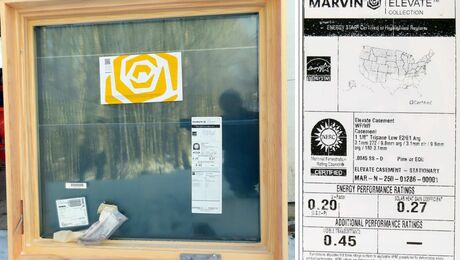Options for temporary heat in MN winter
I’m interested in the opinions of builders and others regarding temporary heat during contruction. My southern MN home is enclosed, windows in, and exterior walls spray foamed. Not as air tight as it will be, but pretty tight nevertheless.
Options include:
1. electric resistance space heat – pros: convenient, no fumes cons: most costly option per BTU, safety concerns for unattended heaters
2. portable kerosene heaters – pros: have unit available cons: fumes (about choked me when used last Saturday), need to refill reservoir tank every 36hr
3. portable LP/NG “cannon” heater – pros: have 155,000 BTU heater w/ thermostat, can connect to directly to NG supply (if I can find correct orifice), least expensive per BTU cons: humidity from combustion, safety
4. buy used furnace – pros: could vent combustion air cons: hassle factor of rigging up “temp” furnace, cost
5. skip heat altogether – pros: least costly, and don’t plan to be working on site much through winter anyhow cons: should I really be letting my house freeze?
Thus far, temps in the teens and 20’s, I was able to comfortably work inside with two 1500W space heaters. By end of day, temp had warmed from 30 to 36 inside. Overnight, indoor temp cooled to 28. Next day, used electric space heaters with kerosene heater, temp at 38 by noon but had headache from kerosene fumes.
So, what do you all think?
GBA Detail Library
A collection of one thousand construction details organized by climate and house part









Replies
A used furnace is a very nice way to go exhausted to the exterior it will help with air changes for fresh warm air to work in and to lower moisture levels of new home construction.
What will your permanent heating system be?
One option might be a used direct vent gas or propane unit. Once you no longer need it, just plug the holes.
Permanent heat is GSHP with NG furnace to serve as air-handler. HVAC will not install any mechanicals until drywall finished, even if not connected to ductwork. What I'm leaning towards is let house freeze (no water, yet), then fire up "cannon" heater to bring temp up to, say, 45 degrees on days I plan to work on-site. Maybe augmenting with electric space heaters to reduce amount of water vapor? Is this foolish thinking?
Kent,
It's OK to let your house freeze. You wrote, "I don't plan to be working on site much through winter anyhow." Under the circumstances, it sounds like heating your house would be a waste of fuel.
Martin: would having some heat dry out the framing and maybe reduce drywall screws popping out later?
Stephen,
Perhaps. I guess the answer depends on how wet the framing lumber was. Even if you don't heat your house, your lumber will dry out over the winter.
Martin - if left to freeze, is it reasonable to assume that the basement slab will freeze too? Or, is it even remotely possible that the basement would stay above freezing if I closed off stairwell? Basement built with ICF block, slab 7 ft below grade.
Kent,
If your house was built with attention to airtightness, and if your air barrier is complete, your basement slab won't freeze.